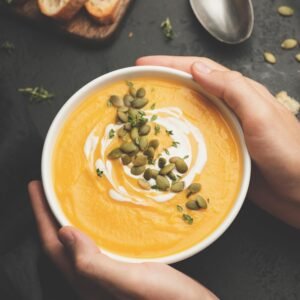Discover why moringa is the ultimate superfood in this comprehensive guide. Explore its exceptional nutritional value and diverse health benefits for overall wellness.
Moringa: The Ultimate Superfood Guide & Benefits
Did you know moringa is called the “miracle tree”? It’s one of the most nutrient-rich plants around. Known scientifically as Moringa oleifera, it’s packed with vitamins, minerals, and bioactive compounds. This makes moringa a top choice in plant-based nutrition.
Moringa can help with inflammation, blood sugar, skin health, and even anti-aging. It’s a key part of a healthy lifestyle. In this guide, we’ll dive into moringa’s origins, uses, and benefits. Discover why moringa is the ultimate superfood.
What is Moringa and Its Traditional Uses?
Exploring the Origins and History of Moringa
The moringa tree, also known as the drumstick tree or horseradish tree, comes from South Asia, especially the Indian subcontinent. It’s known for its great nutrition and many health uses for thousands of years. Moringa oleifera, the most famous type, grows in the Himalayas’ southern foothills. It’s now found in West and East Africa, Central America, the Caribbean, and parts of South America and Oceania.
How Moringa is Traditionally Consumed and Prepared
In many cultures, people eat moringa leaves raw, boiled, steamed, or roasted. They also make traditional teas from it, which are thought to be good for health. Moringa powder, made by drying and grinding the leaves, keeps the plant’s nutrients.
- Moringa leaves are often eaten raw, boiled, steamed, or roasted
- Moringa tea is a traditional beverage consumed for its purported health benefits
- Moringa powder is made by drying and grinding the leaves to retain nutrients
Moringa has been used in traditional medicine and cooking for centuries. Its leaves, seeds, bark, roots, sap, and flowers are all used in different ways. Its rich nutrients and health benefits are still being studied today.
| Moringa Nutrient Content | Per Cup (fresh, chopped leaves) |
|---|---|
| Protein | 2 grams |
| Vitamin B6 | 19% of the RDA |
| Vitamin C | 12% of the RDA |
| Iron | 11% of the RDA |
| Riboflavin (B2) | 11% of the RDA |
| Vitamin A (from beta-carotene) | 9% of the RDA |
| Magnesium | 8% of the RDA |
Why Moringa is the Ultimate Superfood: A Complete Guide to its Benefits
Moringa is known as the “Miracle Tree” or “Tree of Life.” It’s packed with vitamins, minerals, and antioxidants. This makes it a top choice for improving health.
Research shows moringa can help with diabetes, high blood pressure, and inflammation. It also protects against damage and supports healthy skin. This makes it great for overall wellness.
Moringa’s Exceptional Nutritional Value
Moringa leaves are very nutritious, with about 30% protein. This is especially important in areas where people don’t get enough protein. The World Health Organization says many children in developing countries suffer from protein-energy malnutrition.
Moringa is also full of vitamins and minerals. It has more vitamin C than oranges and more vitamin A than carrots. It also has potassium and iron, and all 8 essential amino acids, which is rare in plants.
Moringa’s Potential Benefits for Chronic Conditions
- Blood Sugar Management: Moringa can help keep blood sugar levels stable. It’s good for both diabetics and non-diabetics. Studies show it can also help diabetic rats’ kidneys and pancreas.
- Cardiovascular Health: Moringa’s antioxidants may protect against heart disease. It has vitamins C and E, flavonoids, and polyphenols.
- Anti-Inflammatory Properties: Moringa’s compounds may reduce inflammation. This can help with arthritis, asthma, and skin conditions.
Moringa’s Versatile Uses and Potential Benefits
- Immune System Support: Moringa’s vitamins and minerals can boost the immune system. It fights infections like food poisoning and urinary tract infections.
- Skin and Anti-Aging Benefits: Moringa oil moisturizes and fights wrinkles. It also supports wound healing and protects against aging.
- Cancer Prevention: Moringa may slow tumor growth and kill cancer cells. It could make chemotherapy more effective.
- Organ Health: Moringa protects the kidneys and liver. It helps them work properly.
Nutritional Profile and Health Benefits of Moringa
Moringa oleifera, known as the “miracle tree,” is famous for its nutritional value and health benefits. It grows in the northern parts of India and thrives in tropical and subtropical areas worldwide.
Moringa’s Rich Vitamin and Mineral Content
| Nutrient | Amount per 100g of Moringa Leaves |
|---|---|
| Protein | 9.8g |
| Vitamin A | 6,780 μg |
| Vitamin C | 220mg |
| Calcium | 2,003mg |
| Iron | 28.2mg |
| Magnesium | 368mg |
Moringa’s Potential Benefits for Skin Health and Anti-Aging
Moringa’s antioxidants, like polyphenols and flavonoids, protect the skin from damage. They may also help with anti-aging. Research shows moringa can reduce inflammation and improve skin elasticity, fighting aging signs.
Moringa’s Role in Blood Sugar and Blood Pressure Management
Studies suggest moringa can help control blood sugar and blood pressure. It may improve insulin function and glucose metabolism. This makes it useful for diabetes management. Moringa also helps with vascular health and oxidative stress, aiding in hypertension control.
Moringa’s nutritional profile and health benefits make it a remarkable superfood. Ongoing research highlights its potential in supporting overall health and addressing various health issues.
Using Moringa: Forms, Dosage, and Potential Risks
Moringa is a superfood available in many forms. You can find it as powders, capsules, teas, and seed oils. This makes it easy to add to your daily routine.
Common Forms of Moringa Supplements and Preparations
In the United States, moringa is often sold as leaf powder or dried leaves. You can mix moringa powder into smoothies or sprinkle it on food. It can also be made into tea. Capsules are a convenient way to take moringa, and seed oil is used for skin care.
Recommended Dosage and Safety Considerations
- The U.S. Department of Agriculture (USDA) does not provide the specific nutritional profile of moringa, as the nutrient concentrations can vary widely between brands.
- A typical serving size of moringa leaf powder is approximately 1/2 to 1 teaspoon, depending on the product.
- In studies, doses of up to 2,400 mg of dried moringa leaf powder per day have been used safely for short-term periods.
- Potential side effects or interactions may include gastrointestinal issues or interactions with certain medications, such as thyroid medication, statins, or diabetes drugs.
- It is always recommended to consult with a healthcare professional, especially for individuals with pre-existing conditions or those taking prescription medications.
Moringa is generally safe to eat, but it’s important to follow the right dosage. Knowing the potential risks and interactions helps you use moringa safely and enjoy its benefits.
Conclusion
Moringa is known as the “miracle tree” for good reason. It’s packed with nutrients and offers many health benefits. Its anti-inflammatory and antioxidant properties help manage blood sugar and blood pressure.
As more people learn about moringa, its popularity is set to rise. It’s a natural, plant-based way to boost health and well-being. With vitamins, minerals, and other beneficial compounds, moringa is a great choice for improving your diet and vitality.
Moringa can be used in many ways, from cooking to supplements and skincare. Its wide range of benefits is clear. As research on moringa grows, it’s sure to become even more popular for health and wellness.
Source Links
- https://www.forbes.com/health/nutrition/moringa/
- https://www.medicalnewstoday.com/articles/319916
- https://www.healthline.com/nutrition/6-benefits-of-moringa-oleifera
- https://www.webmd.com/diet/health-benefits-moringa-powder
- https://www.realsimple.com/food-recipes/recipe-collections-favorites/popular-ingredients/moringa
- https://www.vogue.com/article/moringa-new-superfood-to-know
- https://www.bulletproof.com/supplement-articles/dietary-supplements/moringa-benefits/
- https://www.ncbi.nlm.nih.gov/pmc/articles/PMC8373516/
- https://www.ncbi.nlm.nih.gov/pmc/articles/PMC9916933/
- https://www.webmd.com/vitamins-and-supplements/health-benefits-moringa
- https://www.everydayhealth.com/diet-nutrition/all-about-moringa-drumstick-tree-a-complete-scientific-guide/
- https://medium.com/@raihanamapple/unlocking-the-power-of-moringa-powder-a-complete-handbook-to-the-ultimate-superfood-4d2071280d0f
- https://www.goodhousekeeping.com/health/a40758441/moringa-health-benefits/








